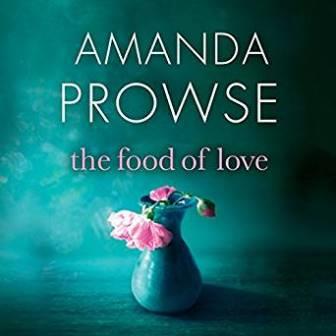
Sometimes it’s good to read something a little different.
Having enjoyed a range of psychological crime fiction lately, I was in the mood to try something different when I spotted ‘The Food of Love’ by Amanda Prowse.
What’s it about?
Freya and her husband, Lockie, are happily married with two teenage daughters. Both are creative types – Freya’s a food writer and Lockie’s a photographer – who enjoy their life and have good relationships with their daughters, built on honesty and trust.
When Lexi’s school suggests she has a problem with food, Freya is dismissive and offended. She’s a good parent who knows and teaches her daughters about healthy eating and exercise. Besides, if Lexi had a problem, she’d tell her mum. Wouldn’t she?
Soon Lexi’s problems worsen and Freya is forced to admit there may be a problem, but she and Lockie have different approaches to resolving the situation. As the tension mounts and Lexi’s health suffers, the family try to support each other as best as they can while learning about the horrors of anorexia.
What’s it like?
Honest. Emotional. Dramatic. In the prologue a young Lexi jumps off a pier, throwing caution and common sense away in her pursuit of life. On an initial read through it’s the act itself that’s shocking: sudden, dangerous and oblivious of the peril she places herself in, Lexi frightens her family badly. As the story progresses, the nature of the shock is transformed. Where did that bold, fearless Lexi disappear to? What happened to her? The contrast between her youthful energy and her anxious weight-watching is shocking in itself, even before we learn about her weight loss methods.
Sometimes this feels a little like a primer on anorexia. Freya is shocked when informed about the various tactics her daughter may employ to avoid gaining weight and the discussion around pro-Ana and pro-Mia websites was a definite case of an author telling instead of showing. Although this information is accurate and Prowse has clearly done her research, the story-telling is stronger when Lexi is given the opportunity to put her struggles into her own words.
However, Prowse’s real interest is the emotional core of her characters and exploring how they respond to Lexi’s illness. Lockie, Freya and Lexie’s big sister, Charlotte, all struggle to know how to act around Lexie and how best to support her. Crucially, they also struggle at times to support each other; Prowse’s depiction of a family in crisis is utterly convincing.
I found Freya’s dismissive attitude irritating at times, probably because it is completely the opposite of my approach to anything involving my children. I’ve always tackled problems by trying to find out more information and by considering all the options available. Freya prefers to characterise her daughter’s mental illness as a ‘blip’, is deeply concerned about what it means for her status as a ‘good’ parent and wants to ‘fix’ Lexie all by herself – even as it becomes clearer that she can’t.
Tell me more
At the end of each chapter Prowse builds our concern by including a few pages focusing on a countdown in hours towards something the family are dreading doing. It feels easy to guess what the countdown is leading up to, but you’re likely to be surprised.
Prowse is fond of adjectives and we are made fully aware of characters’ dress, appearance and setting:
‘Miss Burke entered a bland, square office with closed, grey, vertical blinds and a large map of the world on one wall. A clock ticked loudly. The woman took a seat behind the empty desk and opened her palm, indicating a chair on the other side of the varnished, blond wood.’
Final thoughts
This is an emotional insight into a family struggling to live with the extremely challenging illness that is anorexia. Prowse effectively explores how each family member responds to the situation and each other in a story that builds towards a dramatic finale. The epilogue is perhaps a little anti-climactic and feels cut-off from the rest of the narrative, but I imagine it’ll please most readers.
Prowse’s strength is the completely realistic characterisation and depiction of family interactions, and that’s what made this so easy to read despite the inherent sadness of the material.
This would be a great choice for fans of Jodi Picoult and other authors who use their writing to tackle topical issues.
Like the sound of the author but not the storyline? Never fear: since Prowse self-published her first novel in 2011, she has shown herself to be a prolific author and has published twelve novels and six novellas, so there’re plenty of stories to choose from!


